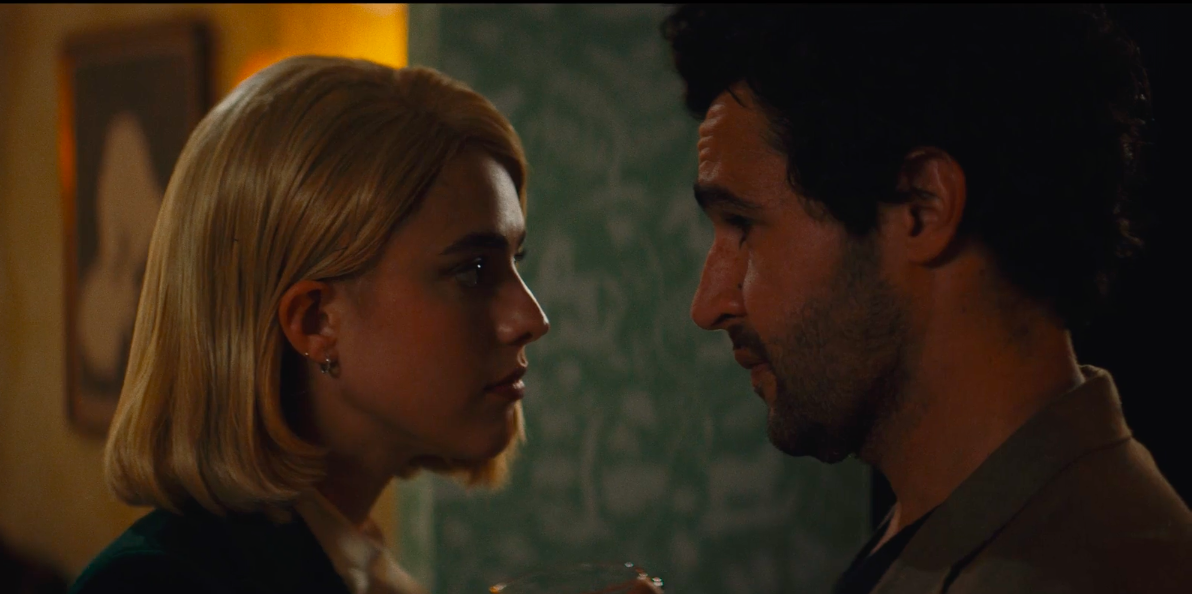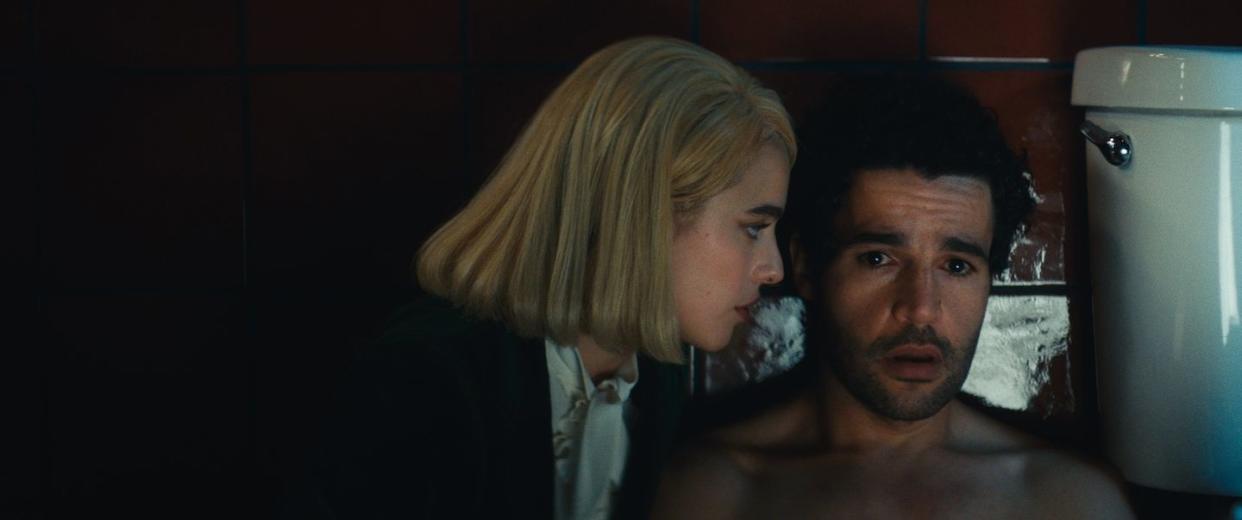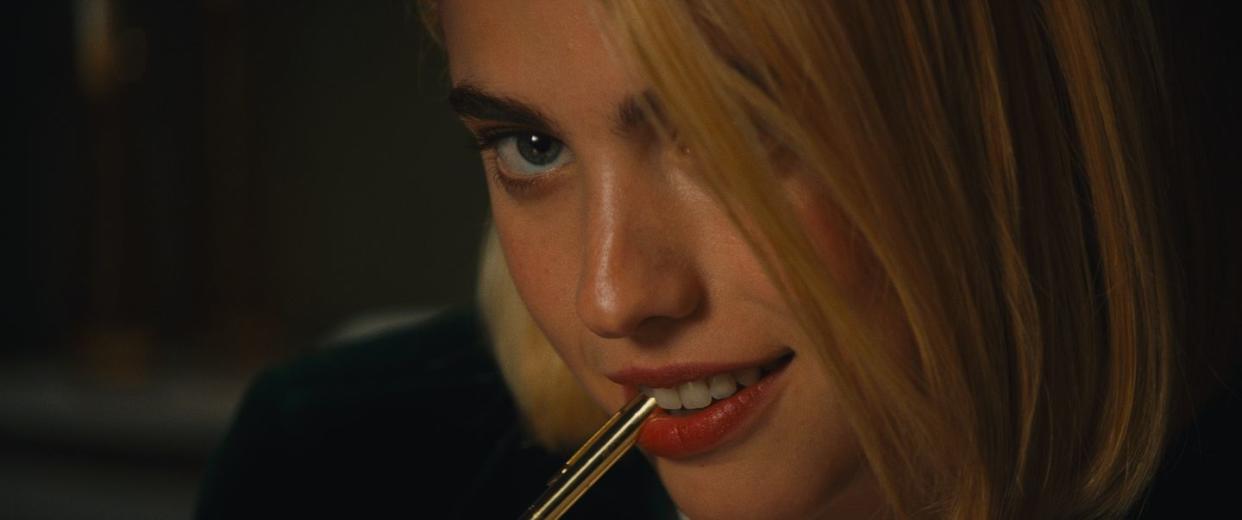Sanctuary’s Margaret Qualley and Christopher Abbott Think the Story Really Does Have a Happy Ending

In the post-pandemic era, you might never want to be stuck inside with someone ever again, but Sanctuary proves just how interesting things can get with only two people in a room—especially if it’s a plush hotel penthouse and the two people in question are actors Margaret Qualley and Christopher Abbott.
In the new movie, which unfolds in real time over the course of a single night, Margaret plays a professional dominatrix named Rebecca who won’t accept that she’s been fired by her wealthy hotel-chain-heir client Hal, played by the Girls star. Over the next 96 minutes, the terms of their relationship mutate and fluctuate, prompting us to think of the shifting nature of power as Rebecca blackmails Hal. Is their relationship strictly business? Who’s manipulating whom?
It’s hard to pin down what kind of movie this is—a psychosexual thriller, it’s got the snappy dialogue of Succession with the high-stakes tension of a play like Who’s Afraid of Virginia Woolf cut with the action and comedy of Mr. and Mrs. Smith—but one thing is for sure: Its stars are completely riveting, commanding total control of your attention.
In an interview with Cosmopolitan, Margaret and Christopher spoke about their dynamic collaboration, their complementary characters, getting broken up with, brain farts, and more.
I know that you were at the top of the director and writer’s list in terms of who they wanted to cast. What were your first reactions to the script?
Margaret Qualley: I just loved it. I thought it was an opportunity to have a lot of fun. I’ve been wanting to work with Christopher for a long time and this seemed like a perfect opportunity.
Christopher Abbott: We were looking for something to do together, and this was the most self-indulgent thing that we could find—so why not do that? It felt like a play to me when I first read it. Micah Bloomberg, the writer, is so good at writing the back-and-forth to characters—it really had a rhythm to it that was so specific.
Since your characters are caught in this psychosexual warfare with each other, did you try to keep your distance before or during shooting? What was your collaboration like?
Christopher: We wanted to leave some things up for those “lightning in a bottle” moments on set. We’ve worked on a lot of dialogue on our own but then would run it before because there was just so much—you need to work on the rhythm and stuff like that. But I think it was a good balance of working with each other, spending a lot of time together, and then saving a little bit of juice for the actual shooting.
When I watched the film, it was really hard for me to tell who was lying and who wasn’t. How aware were you of whether your characters were telling the truth and lying from one scene to the next?
Christopher: There are big main plot points that we wanted to hit, but I think all the little tiny nuances and things that felt off were left up to Margaret and me to just play with.
Performance and identity are central to the film’s themes, which feels kind of meta because you’re both actors. Was that aspect weird or relatable in any way?
Margaret: It was more just…fun. [Laughs.] I know that’s not really very descriptive, but it was.
Christopher: It was fun to play with the idea of how good of an actor the characters are in certain moments. I keep joking that sometimes the acting in the film is bad on purpose. So if anyone thinks I’m bad, it was a choice. That’s how it was supposed to be.

You’ve probably been asked this multiple times today, Margaret: Did you do any research into playing a dominatrix?
Margaret: I’ve been asked many times…and, you know, I kind of wish I had now, because the answer is no! I did not! All I did was just learn my lines very well, like word-perfect, before we started shooting. The whole thing came together really fast. Like, it was probably three weeks after we first got together, so I just spent those weeks walking around New York with my script and getting completely off book so that on the day of shooting, I could play and have fun. It was less a character piece and more just about the dialogue and relationship between our two characters, moment to moment.
Both your current performances are really tensile and flexible, moving back and forth between each other.
Christopher: Like string. And sometimes it’s more taut or more slack, but there’s always a string between us.
Rebecca is kind of an explosive personality, with her vulnerability projected outwardly, whereas Hal is more likely to implode. Can you talk a little bit about how they complement each other?
Christopher: I think that’s the dichotomy of the two: what they’re presenting to each other versus what they are in real life—and how that is sometimes the opposite of what they inherently are. Things always sort of work in opposites, and I think he’s the most confident when he’s dominated because that’s what he wants. That’s where he’s comfortable. And then that starts to kind of go away.…There are moments for both characters of vulnerability and quietness and explosion. It’s like they’re constantly oscillating back and forth, excited to see who they are within that camp.
Margaret: Totally. No one really yells unless they’re out of control in a particular circumstance. There’s a weird correlation between…
Christopher: …power and volume because it’s out of desperation.
I feel like your performances have such a strong physicality to them, Margaret, and that’s no different here. What kind of qualities did you want to bring or project with your character, Rebecca?
Margaret: I didn’t really think about it very much, to be honest. I tend not to intellectualize things while I’m doing it or be too cerebral in the process. I literally can’t even explain it, but I’d get a feeling that a certain walk just felt right for her or a certain movement or quality felt right paired with the dialogue, but nothing was too set in stone.
I read that you grew up dancing. Did you find yourself bringing that into your performance?
Margaret: You know, I think so. I do literally often try to incorporate dance into things just because I love it so much. Once a dancer, always a dancer, probably?
You get to do an actual dance sequence in the movie. Was that choreographed at all?
Margaret: The only part that was choreographed was, like, when I spiked the camera and said that one line, just to make sure to hit it at that moment. Everything else was just a little bit of improvisation.
Christopher: Like jazz.
What about you, Chris? Did you do any research to prepare? Is your process also less cerebral?
Christopher: Margo and I talked about it, and this one didn’t feel so much like a character piece as it did like trying to tackle the thing as a whole…as, like, a movement. I think whatever homework you need to do is fine, but ultimately you want to show up pretty open and not think too much on set. I don’t want to be thinking, What choice should I make here? Whatever homework you did, if you had to do it, is done, and then you put it away and just be open.
What was the most difficult scene to film?
Margaret: Honestly, the hardest for me was the hot-cold scene. And that was just because I wanted everything good and that I never detoured from the script. The rest of the script is so logical and makes sense. He says one thing I follow up with—it’s very conversational and logical. I know what’s coming, so it’s easy to memorize. But that hot-cold scene was not like that at all. It’s crazy and frantic and dependent upon me saying, like, “The sun is shining now!”
Christopher: There was no specifically difficult scene. There were some technically difficult ones, but I would say challenging rather than difficult because we had to work with the camera. It became a bit of a dance for the three of us.

Part of what sets everything in motion is Hal’s gifting of an Audemars Piguet watch to Rebecca, turning this relationship into something purely transactional. Have either of you had that experience, having the tables turned on you in such a way that it changes your entire dynamic?
Margaret: I have in that I’ve been broken up with, which is essentially what that scene is. I’ve been broken up with in a very shitty way.
Christopher: I would have gladly accepted a gift in the past when I’ve been broken up with.
Margaret: [Laughs.] Yeah, I think I’d rather be broken up with and given…
Christopher: …like, a laptop or something.
Then after the watch exchange, there’s further negotiating. Margaret, when your character asks Hal for half his salary, claiming that she’s responsible for his success, I thought that was a little much but then realized she’s right. How was it for her holding the cards in that situation? It reminds me of an economics professor I had once who believed something similar—that wives, even if they didn’t have children, deserve to be paid and compensated for just the mental upkeep of of their husbands.
Margaret: [Long pause, followed by laughter.] I’m sorry. I’m just trying to think of what the exact question was!
Christopher: That’s called a Qualley Brain Fart, what you just witnessed. It happens every once in a while, and you got a rare sighting in the wild.
It’s okay! It’s been a long day. Let me rephrase: Was it empowering to play a character who gains or regains control?
Margaret: I’ll say this: Something that was really gratifying about this experience for me is just that in a lot of ways, Hal does all the heavy lifting for me because I’m kind of just bouncing around whatever he is and what Christopher is doing. And so in that sense, yes. But that’s still not really an answer to your question!
That’s so interesting to hear though, because when I watched the movie, it almost felt like the opposite—that Hal and Christopher are the ones reacting to your character.
Christopher: For the both of us, we were trying to give something to each other and each scene. So while acting is very much reacting, I think we both tried to take an active approach. Instead of reacting, do something to the other person, with each line of dialogue with each scene. That’s sort of, like, the main goal: Do something and then return and you’re a better listener. Like, I’m going to try to do something to you.
[Editor’s note: Spoilers ahead.] How do you think Hal’s and Rebecca’s lives turn out after that final scene? Are they happy?
Margaret: I totally buy it. I like to believe in love stories. I think they’re perfect for each other.
Christopher: I think the ending is particularly cliché, purposefully so. It’s sort of like a wink, saying that this is very much a romantic comedy. I don’t want to give the answers, but I feel like that signals a “happy ending.”
What do you hope audiences will take away from it?
Margaret: I hope everyone has their own experience. Like, I loved hearing your take on it. It’s awesome that everyone’s having a different experience. Mostly, I just hope people are entertained. I just think it’s fun and silly and funny, exciting and hot, and I hope that people just enjoy it.
Christopher: A good night.
Margaret: Yeah, I hope everybody’s just having a nice date!
You Might Also Like
